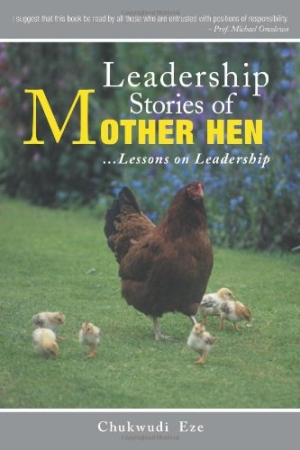Leadership Stories of Mother Hen
Lessons on Leadership
Author Chukwudi Eze, a graduate of Vassar College and Columbia University, has used traditional African storytelling methods to present incisive and compelling truths about leadership in this updated and expanded version of his 2006 work, Leadership Stories of Mother Hen. Moving easily between examples of the way things function, for good or for ill, in the barnyard henhouse and at the heights of leadership in corporations and nations, Eze’s small but powerful book makes the discussion of the privileges and responsibilities of leadership accessible to readers at all levels of sophistication.
Couched in the homely and familiar terms of the henhouse, Eze bolsters his argument for responsible leadership with examples, both historical and contemporary, of people whose actions in the public sphere have been characterized by devotion to the highest human principles. Included among the individuals the author credits with having exercised exemplary leadership in spite of facing extreme difficulties are Nelson Mandela, the Rev. Dr. Martin Luther King, Jr., Eleanor Roosevelt, Yitzhak Rabin, President Barack Obama, and Pope John Paul II.
Eze is a gifted and passionate storyteller who is not afraid to confront evil in high places, both secular and religious. He compares leaders who commit or condone atrocities against their own people to mother hens who slaughter and cannibalize or abandon their chicks. Included in his discussion of leadership gone awry are the acts of Nazi Germany, various other examples of “ethnic cleansing,” murder in the name of religion, and the neglect of the needs of the poor by wealthy leaders concerned only with self-aggrandizement.
But the author does not leave ordinary individuals out of his discussion. Also included are the stories of mothers who have murdered their children; parents, especially fathers, who absent themselves from the lives of their children while pursuing their careers or engaging in debauchery; grown children who ignore the needs of their elderly parents; and business owners who employ questionable ethics. Eze also describes the responsible mother hen—one who feeds, guides, and guards her chicks until they are able to care for themselves. He uses this simple and convincing analogy to convey the sense of security, warmth, and comfort that compassionate and responsible leadership can impart to a society or an organization.
Although Eze is the author of four books and is a good communicator, but he ought to engage the services of a proofreader and an editor to correct his frequent errors in grammar, punctuation, and spelling. Incorrect word choice and confusing sentence structure are also prevalent, as in this sentence: “That is the grand old strategy of evil forces, which has wretched havoc on many lives.”
Nevertheless, Eze’s timely book, with its assertion that “the rate and level of a people’s evolution is … permanently tied to the quality of their leadership,” is a welcome addition to the literature on the topic.
Reviewed by
Kristine Morris
Disclosure: This article is not an endorsement, but a review. The publisher of this book provided free copies of the book and paid a small fee to have their book reviewed by a professional reviewer. Foreword Reviews and Clarion Reviews make no guarantee that the publisher will receive a positive review. Foreword Magazine, Inc. is disclosing this in accordance with the Federal Trade Commission’s 16 CFR, Part 255.

